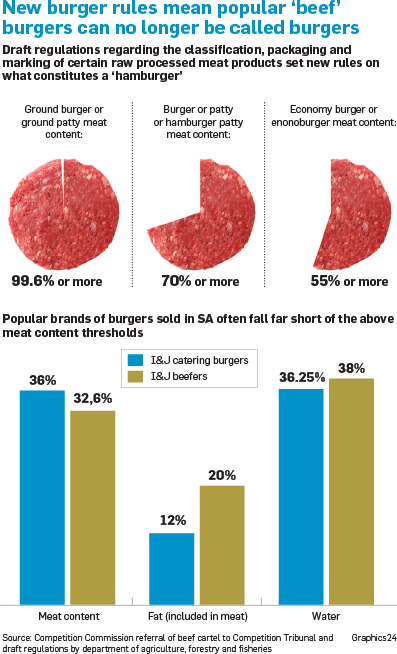
New regulations mean popular brands can no longer legally call their food burgers if they contain too little meat
New draft regulations on meat products could force companies like I&J to rename their popular “burger” brands – some of which contain less than 10% meat.
The proposed regulations, released on October 26, for the first time create rules for what qualifies as a “burger”, “hamburger” or “patty” – it will have to be at least 55% meat.
Crucially, this includes animal fat, which is liberally added to most cheap brands of burgers.
Even then, any burger that is less than 70% meat and fat will have to be called an “economy burger” or something similar to inform consumers of its inferior quality.
Anything containing so-called mechanically deboned meat, which is used to make viennas, is automatically an economy burger, according to the draft regulations.
City Press can reveal just how far short of these rules some popular “burger” brands fall.
The recent Competition Commission referral of an alleged beef cartel to the Competition Tribunal has revealed the composition of a number of popular burger and vienna brands sold by JSE-listed AVI’s subsidiary, I&J.
Their recipes are included in the commission’s referral as part of a contract manufacturing agreement between I&J and Karan Beef.
This agreement allegedly amounts to cartel conduct because it entails Karan withdrawing from specified product markets while manufacturing I&J’s products for those markets. Karan, which stopped manufacturing I&J burgers in 2015, settled with the commission and wasn't referred to the tribunal with I&J.
Among the I&J products that are marketed as “burgers”, but would be forced to be renamed by the new regulations are:
. I&J Catering Burgers, available at Makro and in the catering industry, which are 36% “meat”.
To be precise, they contain 24% mechanically deboned chicken and 12% frozen beef fat. Another 10% is processed soy mince and the main ingredient – 36.25% – is water.
. I&J’s popular Beefer brand of “beef patties”, which are 32.6% meat, will no longer qualify to be named burgers. Even this low meat content is an overstatement because Beefers have an “acceptable fat range” of up to 23%, according to the recipe in the Karan agreement. That means the meat part can be as low as 9.6%. The rest is soy mince, potato starch and 38% water.
. I&J Tasty Burgers have seemingly been discontinued since the agreement with Karan, but these were even more meat-deprived, with a total meat and fat content of 20%, of which 13% was meant to be fat. That leaves 7% actual meat. The bulk of the burger was potato and potato starch, which made up more than 47% of the product.
I&J and Karan have many products that would easily qualify as “burgers” under the new regulations as the meat content is more than 70%.
There is also no reason to believe other manufacturers’ burgers aimed at poor consumers are any better than the ones whose recipes have incidentally been revealed by the Competition Commission.
The packaging of Pick n Pay’s no-name chicken burgers, for instance, reveal a meat content of 51% – too little to qualify as a burger under the proposed new regulations.
- Update: Following the publication of this article, Karan Beef got in contact to clarify a couple of issues. Karan no longer manufactures I&J burgers; They stopped in 2015. Second, Karan settled with the competition commission and was not referred to tribunal alongside I&J. The article was amended on November 14 2018 to reflect this.




 Publications
Publications
 Partners
Partners









